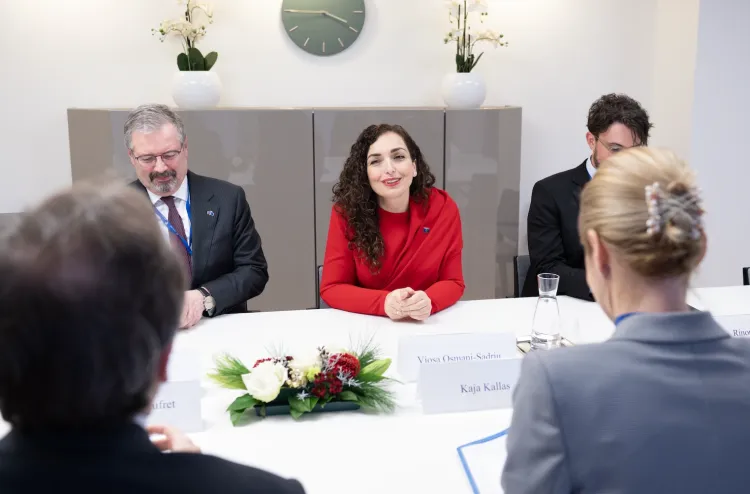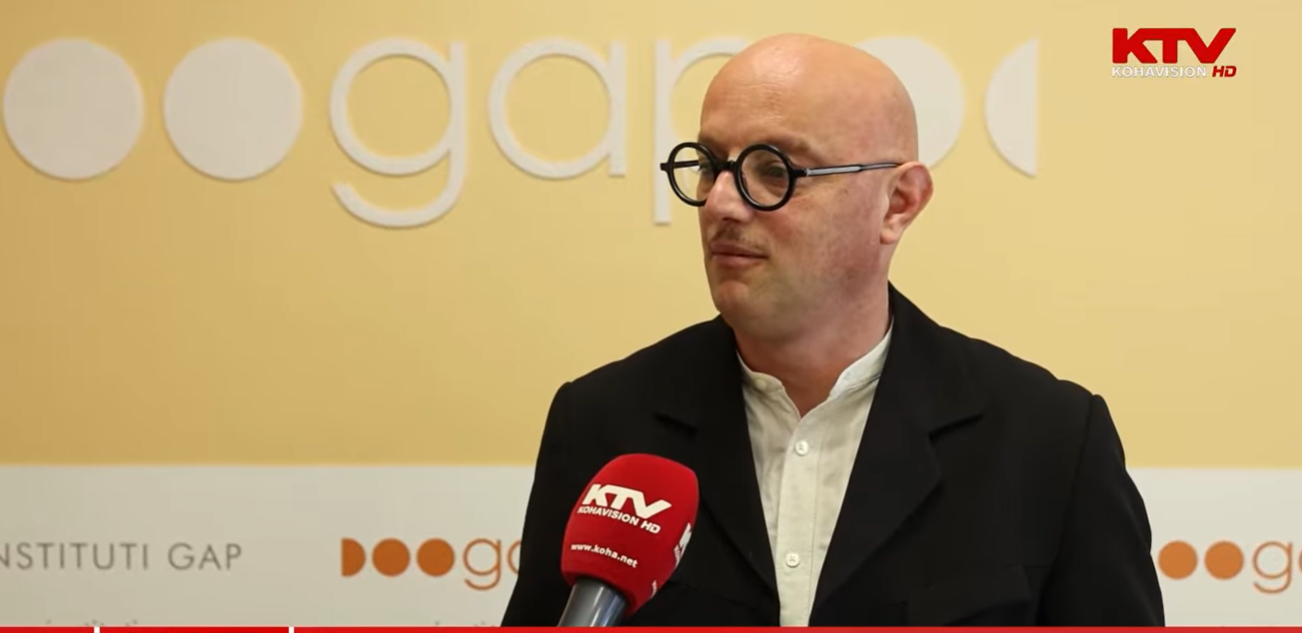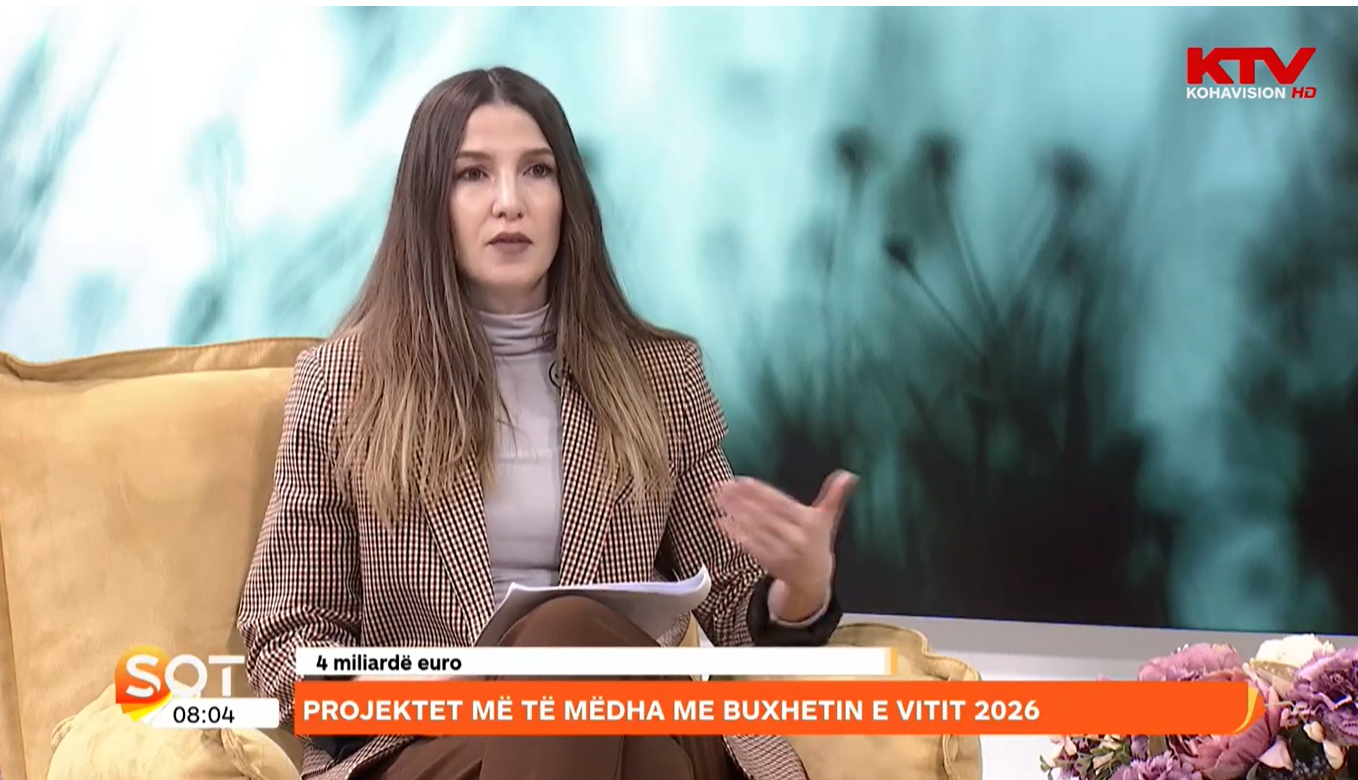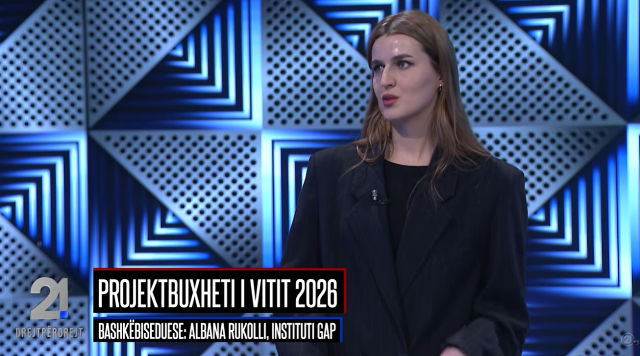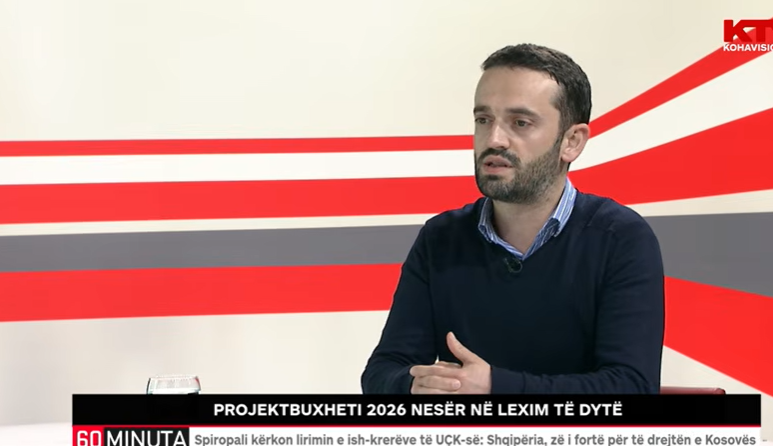Distance Learning in Pandemic Times: Case Study in the Municipalities of Prizren, Obiliq and Hani i Elezit
12/02/2021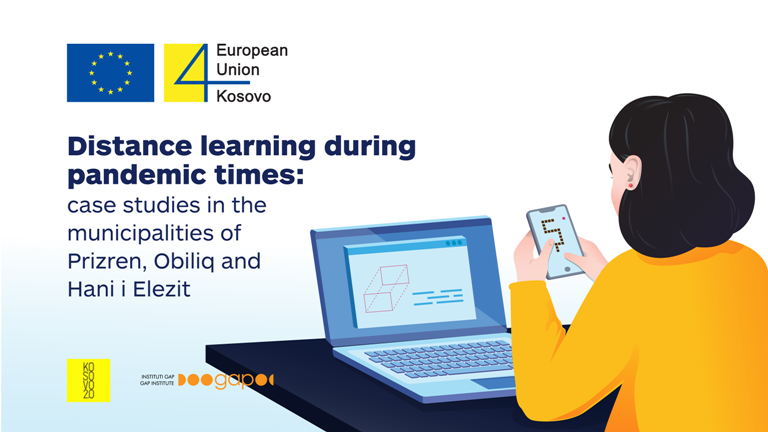
This research was conducted by Vesa Ferizi, under the mentoring project supported by the European Union and implemented by Kosovo 2.0 and the GAP Institute.
Introduction
In response to the risk from the spread of the COVID-19 virus, Kosovos institutions discontinued classes at all levels of education from mid-March 2020. School premises were assessed to be potential hotbeds for the spread of COVID-19. Thus, teaching was discontinued one day prior to the emergence of the first cases of infections. Given the warnings of experts that the pandemic may continue for a longer period of time, the Ministry of Education and Science (MES) began the preparations for the development of distance learning. This was a form of teaching never practiced, projected or planned before in Kosovo. As a result, the introduction of the distance learning process was associated with difficulties and ambiguities.
Distance learning was developed in several forms. Soon after the emergence of the COVID-19 pandemic in Kosovo, remote learning was applied through the broadcast of classes in the public broadcaster (RTK4) for students of grades from one to nine. Native Language, Math, and Man and Nature were the classes offered for grades one to four. Native Language, Math, Man and nature, Civic education, Biology, Physics, English Language, History, Geography and Information and Communication Technology were the classes offered for grades five to nine. The second phase started after the third week of April, with distance learning distributed to all primary school teachers. Students were encouraged to use the Internet and attend online classes. The third phase started on September 14, with teaching in schools, however with limited hours and the possibility of returning to distance learning as necessary, depending on the epidemiological situation.
Despite the weaknesses and uncertainties, distance learning provided an alternative to continue with teaching in pandemic conditions. Case studies included in this report indicate that the process was generally well-coordinated between the authorities of the Ministry of Education, Kosovo municipalities, school directorates and parents councils. A significant contribution was also provided by NGOs, providing technical assistance in the process of distance learning.
Despite its efforts, distance learning failed to be all-inclusive. According to MES data, 9,070 students did not attend this form of teaching. The main reasons were the lack of internet in some areas, the lack of equipment on the part of students, limited skills in the use of technology, and difficulties with access for children with special needs.
Legal and technical aspect of distance learning development
The Law on Pre-University Education and the Strategic Education Plan in Kosovo 2017-2021, in a general scope for other (non-pandemic) situations, also envisage the possibility of developing a form of distance learning. The strategic plan states that schools, in cooperation with municipalities, should develop action plans preventing school dropout, considering the possibility of organizing alternative learning (e.g. distance learning) for students who, for various specific reasons, cannot attend regular classes. This form of learning, although recommended in the education strategy, was never implemented in practice prior to the pandemic. Article 9 of the Law on Pre-University Education provides that the Ministry may issue bylaws to avoid emergency situations related to the requirements for compulsory education.”
Ten days after the emergence of the first cases of COVID-19 infections in Kosovo, the Ministry of Education and Science drafted and distributed a guideline on conducting distance learning. This guideline defined and assigned responsibilities between the national and local levels in initiating and managing the distance learning process. The guideline provides that the Ministry of Education would establish a platform for virtual communication (Virtual Education Collegium) with all municipal education directors in Kosovo. Municipalities would coordinate and manage education staff at the municipal level with a focus on online learning. To achieve this goal, municipalities would establish forms of decision-making, reporting and performance evaluation of staff through limited physical communication and via telephone, social media or electronic messages. According to this guideline, municipalities should report to the Ministry of Education and Science on a daily basis regarding the progress of distance learning.
The Ministry of Education has also issued such guidelines for secondary schools, vocational schools, students with special needs, and provided weekly information on the schedule of classes in public television broadcasts.
The start of the new school year 2020/2021 started with a combination of distance learning and in-person classes in school. This plan is included in the master plan of the Ministry of Education for the conduct of teaching in pandemic conditions.
One of the biggest issues with distance learning was the technical dimension of the process.A number of students lacked computers or similar electronic devices, whereas some areas there had no Internet network distributed.
As a first preparation for the development of distance learning, MES reached an agreement with Kosovo Public Television, stating that the fourth channel of the public broadcaster (RTK 4) will remain available for the provision of distance learning. The ministry also drafted and distributed in all municipalities of Kosovo thetechnical guideline on the use and utilization of the Zoom electronic platform.
Gradually, the technical process of distance learning has improved. Thus, the use of Zoom orviber platforms was avoided, and a unique platform was developed for use by all schools and all municipalities. This platform, titled eshkollori can be simultaneously used (viewed) by school principals, teachers, students, parents, as well as other interested parties, having an opened account on the platform.
Development of distance learning in the municipalities of Prizren, Obiliq and Hani i Elezit
The organization of distance learning started with the Ministry of Education and Science, providing instructions for the Municipal Directorates of Education (MED). The instructions were then given to school principals, who transferred them to the teachers, who in turn contacted students and their parents regarding distance learning.
The introduction of the distance learning process in municipalities came unexpectedly (due to the pandemic) and the technical dimension of this initiative was not fully prepared. Municipalities involved in this research, namely Prizren, Obiliq and Hani i Elezit, had no data in the first phase regarding the technical infrastructure available to students and teachers.In general, municipalities took initiatives in distributing computers and electronic tablets to students who stated not to have such devices available.NGOs, various volunteers and local businesses have also played a significant role in this regard in the municipalities.
In addition to the technical aspect, the initial challenge of distance learning was the skills of teachers to provide distance learning, given the lack of experience in this area and the lack of previous trainings on the management of the process of distance learning. Municipalities experiences in overcoming this challenge varied.
Teaching process in the Municipalityof Hani i Elezit - The process of distanced learning in municipality of Hani i Elezit, with 1,666 students and 130 teachers registered in primary and secondary schools in 2019, started differently than in the other municipalities. An element that facilitated the process in this municipality was the availability of laptops to teachers (Interview with the Municipal Director of Education in Hani i Elezit, Mehduh Vlashi). The municipality had already provided laptops for all teachers several years before the emergence of the need for the compulsory use of technology in March 2020, an action which is also suggested in the “Strategic Plan for Education in Kosovo 2017-2021”.
The fact that teachers owned technological equipment allowed the municipality to conduct distance learning prior to the recommendations from the Ministry of Education and Science. When classes were discontinued throughout the country, it was not long before the municipality of Hani i Elezit organized teachers to start distance learning with their students on a regular basis through calls on social media. This learning development alternative was considered to have been more appropriate for the students and teachers than the one chosen and recommended by the Ministry.
After the publication of instructions by the Ministry of Education, the municipality of Hani i Elezit was forced to stop its classes in their improvised form, in order to comply with the instructions of the Ministry. The broadcast of the classes on RTK and the organization of zoom calls only 1-2 times a week were considered insufficient for the students by the municipality of Hani i Elezit, claiming that their method was more productive. In the first two weeks after the regular classes were interrupted, students in the municipality met virtually with their teachers on daily basis, following the planned class teaching schedule. This way, they managed to stay in direct contact with teachers, and spend more time involved in learning, and managed to cover all contents of class units, as in the classroom.
The only challenge in conducting such teaching was that students who had no electronic device enabling them to connect to Zoom would miss the class altogether. For this reason, after two weeks, the municipality of Hani i Elezit continued with teaching in line with the recommendations of the ministry. According to the UNDP report, in the Ferizaj region, which includes the municipality of Hani i Elezit, 96.05 percent of students were involved in distance learning, while the rest were not mainly due to lack of devices and internet access.
To help solve these problems, the municipality of Hani i Elezit organized to distribute electronic devices from school inventories to the families of students who lacked them. The devices distributed by the municipality also included the first laptops the municipality had provided to teachers, before replacing them with new ones shortly before March 2020. To help secure electronic devices for students, the municipality received a single donation of 2-3 tablets from a local business, and is yet to receive a donation from the Ministry of Education and Science (interview with the Director of the Directorate of Education in the Municipality of Hani i Elezit, Menduh Vlashi) .
The devices distributed to students were not of the highest quality, as they have been used for a long time. However, digitalization in the municipality of Hani i Elezit is more related to the development of electronic platforms to facilitate the learning process rather than the provision of new devices. Although the development of such platforms is under the powers of municipalities, Hani i Elezit considers that the ministry should develop them on a national level, serving as a basic regulator for teaching, and ensure there is not much difference between municipalities. The Ministry addressed this issue at a later stage of distance learning, developing the e-shkollori platform.
In the conduct of distance learning from March to June 2020, the Municipal Directorate of Education in Hani i Elezit had access to all meetings of students with teachers, through Zoom. The Municipality used this access to monitor the process, in addition to following the situation through the reporting forms of teacher, following MES instructions.However, as with the Municipality of Obiliq, Hani i Elezit also failed to issue a comprehensive assessment of the conduct of distance learning.
Teaching in Obiliq - In 2019, the Municipality of Obiliq had 3,814 students enrolled in primary and secondary schools, and the number of those who did not have access to distance learning during the period March-June 2020 is small. According to a UNDP report, in the region of Prishtina, which also includes the municipality of Obiliq, 4.37 percent of students had no access to distance learning for various reasons. The municipality of Obiliq has not taken any initiative for catch-up classes for such students, as most of teaching materials for primary schools are already accessible on the Ministry of Education and Science platform, E-mesimi.
The conduct of distance learning highlighted the need for the use of electronic devices and platforms by students and teachers, uncovering another side of the definition of the word “digitalization”, previously not seen as significant in Obiliq. In the lack of a common definition for all municipalities, digitalization in the municipality of Obiliq means the provision of electronic devices to schools, such as computers, laptops and other tools for science subjects, rather than the development of electronic platforms. The future of digitalization in the municipality of Obiliq seems to be only in the form of supplying schools with more IT (5) and science (2) cabinets for the following classes: “physics”, “chemistry”, “biology”). Procedures of this supply are already in the procurement process. However, the security of school facilities remains a challenge for the fulfillment of these priorities. In terms of the development of digital platforms for distance learning, the Ministry of Education and Science has offered this opportunity to municipalities (Conversation with the Deputy Minister of Education, Diellza Kukaj), however, the Municipal Directorate of Education opted for their schools to conduct their activities through the e-Mesimi and other platforms (Zoom, Google Meet, Google Classroom as well as Viber and Messenger).
To facilitate distance learning, the electronic devices from school cabinets were distributed to students who lacked them. The Ministry of Education and Science and GIZ also helped to cover the needs in the municipality of Obiliq through small donations of laptops and tablets, respectively (interview with the Municipal Education Director in Obiliq, Rexhep Zeka).
With all the innovation that distance learning introduced, the process could have been used to initiate reforms in the education system, however the municipality of Obiliq rather considers it an improvisation to ensure continuation of teaching. In the new school year 2020/2021, the teaching process returned to classrooms, with the new teaching, learning and assessment methods not implemented. The main reason for the lack of changes in teaching was the absence of prior preparation for distance learning. The entire process was unknown to the education system, and the period March-June 2020 served as a suitability test between the development of distance learning and conditions and circumstances in the municipality of Obiliq, and improve the process at later stages.
Monitoring of the process during this period was not of the highest level. It was completed through teachers reports to school principals, who then reported to the Municipal Directorate of Education, following the instructions of the Ministry. No full assessment of the distance learning process in the Municipality of Obiliq was made from these reports. The lack of such assessment may result in the lack of reform initiatives to improve teaching, both class and distance.On reason for the failure to issue such an assessment is, again, the lack of prior preparation.The Municipal Directorate of Education argues that such assessments should only be made when institutions are engaged in meeting the optimal conditions for the development of the process.
Teaching in Prizren - Unlike the municipalities of Hani i Elezit and Obiliq, the municipality of Prizren is one of the largest municipalities in Kosovo, and in the period March-June 2020 it was tasked with responsibility of ensuring technical preparations of teaching materialsfor broadcast on RTK and the Ministry of Education and Science platform on YouTube. As the number of persons from non-majority communities in Prizren is higher, the municipality, in cooperation with the ministry, is committed to organizing teachers to prepare teaching materials in Turkish and Bosnian for students from these communities throughout the country, in order to ensure equal access to distance learning. Consequently, all teaching materials were shot in the “Emin Duraku” in Prizren school. The two most significant challenges faced by teachers involved in recording class materials were the movement restrictions due to curfew and the time pressure, as the materials needed to be used as soon as possible.
Furthermore, in the municipality of Prizren teachers organized themselves to assist the distance learning process. The use of Zoom or Google technology and platforms was entirely new to many teachers, which is why one of the first things the teachers did was to translate the instructions for the use of such platforms, from English to Albanian, ensuring that all teachers are able to provide their students the best of these platforms (Interview with the Municipal Education Director in Prizren, Xhemile Vezgishi).
Inclusion of students in distance learning is considered to have been high in the Municipality of Prizren, which had 21,044 students enrolled in primary schools in 2019. Of that number, according to a UNDP report, only 1.44 percent did not attend distance learning, with the prevailing reason being the use of the same electronic device by more than one child in the household. Due to the higher number of students in the municipality of Prizren, the number of donations of devices was higher. The municipality received six laptops from the Ministry of Education and Science and 50 tablets from the organization Ecology International, which were distributed to students families following the criteria defined by the ministry.
As in the other two municipalities, equipment from school cabinets were also donated to the students families in Prizren, in order to tackle the issue highlighted in the above-mentioned UNDP report. In addition, the municipality made efforts to adjust the school schedule in such a way as to reduce overlaps in the schedule of students from the same household who use the same device for class meetings in Zoom.
As an alternative way to solve the problem of non-attendance at school, the municipality of Prizren had initially made the plans for the organization of supplementary classes in September 2020. This, however, did not last as expected due to the state of public health. For this reason, an initiative was taken to develop a digital platform for students in the municipality of Prizren, which would include 25 percent of the curriculum that was originally reduced to adapt to distance learning. Thus, unlike the other two municipalities, in addition to increasing the number of technological equipment in schools, digitalization in Prizren also included the development of digital education platforms which would also be used after the full return to the classroom teaching.
During the development of distance learning, in the period March-June 2020, in accordance with the instructions of the Ministry, the monitoring of the learning process was done through weekly reports of school principals in MED. As in other municipalities, Prizren also failed to issue an comprehensive assessment of the process from such reports, due to lack of staff in the Directorate of Education. Hiring new staff for this purpose would have taken around two months, which is why it was decided not to go ahead with that plan. As a result, assessment on distance learning are now missing.
Conclusions
Distance learning is still a new experience for Kosovo municipalities. The introduction of this process was the only alternative, despite the obvious challenges and the uncertainties the local government had on the process. The assessment of the process (distance learning) in the three municipalities (Prizren, Obiliq and Hani i Elezit) reveals similar experiences of management, coordination and reporting. A number of similar issues were observed in all three municipalities, mainly related to the lack of time for the municipalities to train teachers on distance learning and the lack of electronic devices for some students.
According to the data from the Ministry of Education, 9,070 students did not attend distance learning, in both cycles (lower secondary and upper secondary).In the beginning of 2020, in both cycles, Kosovo had a total of 329,589students, which means that 3.5% of students did not attend distance learning.The main reasons for not attending distance learning, according to official reports of the Ministry of Education, were the lack of Internet in some areas, the lack of equipment on the part of students, limited skills in the use of technology, and difficulties with access for children with disabilities.
The entire policy of the Ministry of Education and the municipalities of Kosovo in preparing and delivering distance learning consisted of three main principles: preserving the health of the population, respectively students and teachers, ensuring continuity and not interrupting the teaching process for a longer period, and ensuring that school buildings are safe and equipped with facilities to prevent or reduce the risk of infection with COVID-19.
However, despite the measures taken, the number of students and teachers infected with COVID-19 from September 14 until the second week of December was relatively high. According to the quarterly report of the Inspectorate of Education for teachers, staff and students tested, infected and healed during the quarterly period (14.09.2020 - 11.12.2020) 15,795 teachers were tested for COVID-19, with 2,301 teachers resulting positive, of 6,090 students who were tested for COVID-19, 1,470 students resulted positive, and 284 school support staff were affected by coronavirus during this period.
This report has been published within the first cycle of the Mentorship Program which aims to enhance research and writing skills for young researchers and journalists through the mentoring by senior researchers and journalists at GAP Institute and Kosovo 2.0.
The report has been published with the assistance of the European Union. The contents of this publication are the sole responsibility of GAP Institute and Kosovo 2.0, and do not represent the views of the European Union. The EU funded project "Innovation for resilient media and citizen engagement" is implemented by: Kosovo 2.0 and GAP Institute.
The report is also available in Serbian language, please write at info@institutigap.org.
Vesa Ferizi studies English language and literature at the faculty of philology, University of Prishtina. Words are her biggest passion, so in addition to spending a lot of time with books, she also writes regularly on her DewBlog blog. During her adolescence, she was engaged in different community volunteer activities. Currently, she is challenging herself in a professional mentorship program.




